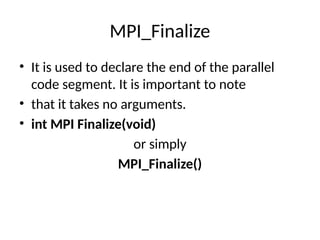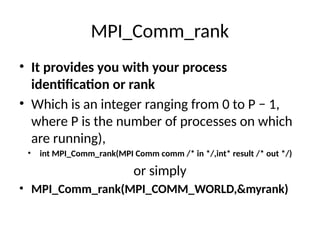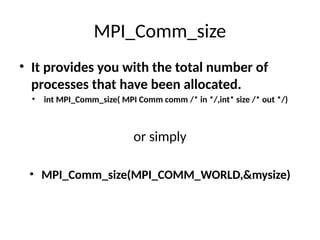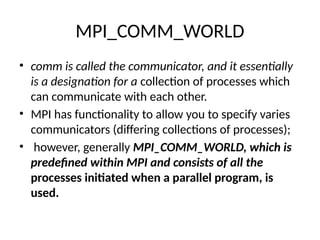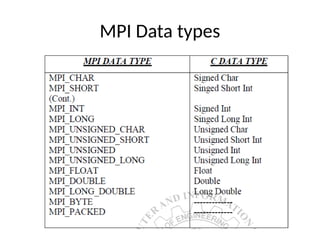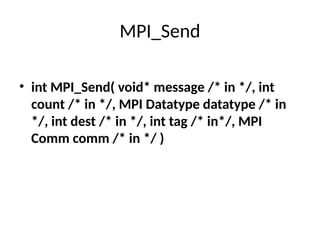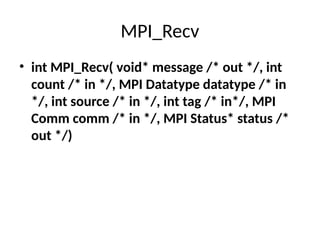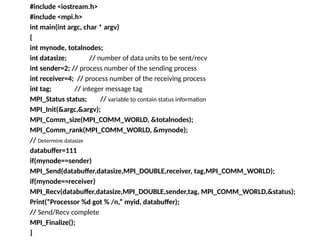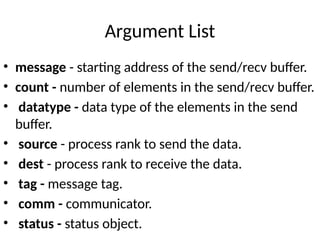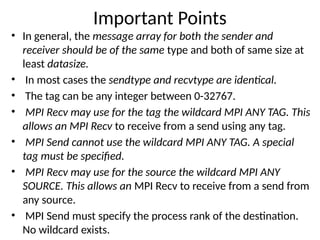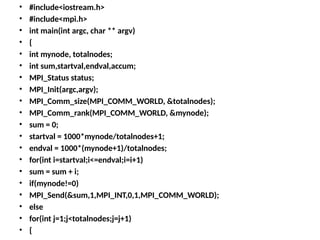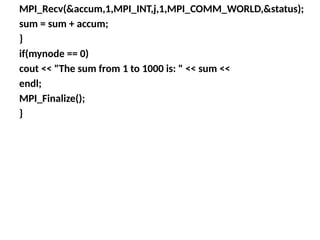Wondershare Filmora Crack 2025 For Windows Free
- 2. Shared Memory Model ⢠In the shared-memory programming model, tasks share a common address space, which they read and write asynchronously. ⢠Various mechanisms such as locks / semaphores may be used to control access to the shared memory. ⢠An advantage of this model from the programmer's point of view is that the notion of data "ownership" is lacking, so there is no need to specify explicitly the communication of data between tasks. Program development can often be simplified. ⢠An important disadvantage in terms of performance is that it becomes more difficult to understand and manage data locality.
- 3. Shared Memory Model: Implementations ⢠On shared memory platforms, the native compilers translate user program variables into actual memory addresses, which are global.
- 5. The Message-Passing Model ⢠A process is (traditionally) contain program counter and address space ⢠Processes may have multiple threads â program counters and associated stacks â sharing a single address space. ⢠MPI is for communication among processes ïseparate address spaces ⢠Interprocess communication consists of â Synchronization â Movement of data from one processâs address space to anotherâs.
- 6. Message Passing Model Implementations: MPI ⢠From a programming perspective, message passing implementations commonly comprise a library of subroutines that are imbedded in source code. The programmer is responsible for determining all parallelism. ⢠Historically, a variety of message passing libraries have been available since the 1980s. These implementations differed substantially from each other making it difficult for programmers to develop portable applications. ⢠In 1992, the MPI Forum was formed with the primary goal of establishing a standard interface for message passing implementations. ⢠Part 1 of the Message Passing Interface (MPI) was released in 1994. Part 2 (MPI-2) was released in 1996. Both MPI specifications are available on the web at www.mcs.anl.gov/Projects/mpi/standard.html.
- 7. Types of Parallel Computing Models ⢠Data Parallel â the same instructions are carried out simultaneously on multiple data items (SIMD) ⢠Task Parallel â different instructions on different data (MIMD) ⢠SPMD (single program, multiple data) â not synchronized at individual operation level ⢠SPMD is equivalent to MIMD since each MIMD program can be made SPMD (similarly for SIMD, but not in practical sense) Message passing (and MPI) is for MIMD/SPMD parallelism. HPF is an example of a SIMD interface
- 8. Message Passing ⢠Basic Message Passing: â Send: Analogous to mailing a letter â Receive: Analogous to picking up a letter from the mailbox â Scatter-gather: Ability to âscatterâ data items in a message into multiple memory locations and âgatherâ data items from multiple memory locations into one message ⢠Network performance: â Latency: The time from when a Send is initiated until the first byte is received by a Receive. â Bandwidth: The rate at which a sender is able to send data to a receiver.
- 9. Message Passing Model Implémentations: MPI ⢠MPI is now the "de facto" industry standard for message passing, replacing virtually all other message passing implementations used for production work. Most, if not all of the popular parallel computing platforms offer at least one implementation of MPI. A few offer a full implementation of MPI-2. ⢠For shared memory architectures, MPI implementations usually don't use a network for task communications. Instead, they use shared memory (memory copies) for performance reasons.
- 10. Methods of Creating Process ⢠Two method of creating Process 1. Static Process Communication ⢠Numbers specified before execution starts ⢠programmer explicitly mention in code ⢠Difficult programming but easy implementation 2. Dynamic Process Communication ⢠Process creates during execution of other processes ⢠System calls are used to create processes ⢠Process number vary during execution
- 11. Methods of Creating Process ⢠In reality Process number are defined prior to execution ⢠One master Processes ⢠Many slave Processes which are identical in functionality but have different id
- 12. Message Passing Interface (MPI) ⢠The simplest way to communicate point to point messages between two MPI processes is to use â MPI_Send( ) ⢠to send messages â MPI_Recv( ) ⢠to receive messages
- 13. Message Passing Interface (MPI) Requirement ⢠The data type being sent/received ⢠The receiver's process ID when sending ⢠The senderâs process ID (or MPI_ANY_SOURCE) when receiving ⢠The senderâs tag ID (or MPI_ANY_TAG) when receiving
- 14. Message Passing Interface (MPI) ⢠In order to receive a message, MPI requires the type, processid and the tag match if they donât match, the receive call will wait forever-hanging your program
- 15. MPI_Init It is used initializes the parallel code segment. Always use to declare the start of the parallel code segment. ⢠int MPI_Init( int* argc ptr /* in/out */ ,char** argv ptr[ ] /* in/out */) OR Simply
- 16. MPI_Finalize ⢠It is used to declare the end of the parallel code segment. It is important to note ⢠that it takes no arguments. ⢠int MPI Finalize(void) or simply MPI_Finalize()
- 17. MPI_Comm_rank ⢠It provides you with your process identification or rank ⢠Which is an integer ranging from 0 to P â 1, where P is the number of processes on which are running), ⢠int MPI_Comm_rank(MPI Comm comm /* in */,int* result /* out */) or simply ⢠MPI_Comm_rank(MPI_COMM_WORLD,&myrank)
- 18. MPI_Comm_size ⢠It provides you with the total number of processes that have been allocated. ⢠int MPI_Comm_size( MPI Comm comm /* in */,int* size /* out */) or simply ⢠MPI_Comm_size(MPI_COMM_WORLD,&mysize)
- 19. MPI_COMM_WORLD ⢠comm is called the communicator, and it essentially is a designation for a collection of processes which can communicate with each other. ⢠MPI has functionality to allow you to specify varies communicators (differing collections of processes); ⢠however, generally MPI_COMM_WORLD, which is predefined within MPI and consists of all the processes initiated when a parallel program, is used.
- 20. MPI Data types
- 21. MPI_Send ⢠int MPI_Send( void* message /* in */, int count /* in */, MPI Datatype datatype /* in */, int dest /* in */, int tag /* in*/, MPI Comm comm /* in */ )
- 22. MPI_Recv ⢠int MPI_Recv( void* message /* out */, int count /* in */, MPI Datatype datatype /* in */, int source /* in */, int tag /* in*/, MPI Comm comm /* in */, MPI Status* status /* out */)
- 23. #include <iostream.h> #include <mpi.h> int main(int argc, char * argv) { int mynode, totalnodes; int datasize; // number of data units to be sent/recv int sender=2; // process number of the sending process int receiver=4; // process number of the receiving process int tag; // integer message tag MPI_Status status; // variable to contain status information MPI_Init(&argc,&argv); MPI_Comm_size(MPI_COMM_WORLD, &totalnodes); MPI_Comm_rank(MPI_COMM_WORLD, &mynode); // Determine datasize databuffer=111 if(mynode==sender) MPI_Send(databuffer,datasize,MPI_DOUBLE,receiver, tag,MPI_COMM_WORLD); if(mynode==receiver) MPI_Recv(databuffer,datasize,MPI_DOUBLE,sender,tag, MPI_COMM_WORLD,&status); Print(âProcessor %d got % /n,â myid, databuffer); // Send/Recv complete MPI_Finalize(); }
- 24. Argument List ⢠message - starting address of the send/recv buffer. ⢠count - number of elements in the send/recv buffer. ⢠datatype - data type of the elements in the send buffer. ⢠source - process rank to send the data. ⢠dest - process rank to receive the data. ⢠tag - message tag. ⢠comm - communicator. ⢠status - status object.
- 25. Example Code 1
- 26. Important Points ⢠In general, the message array for both the sender and receiver should be of the same type and both of same size at least datasize. ⢠In most cases the sendtype and recvtype are identical. ⢠The tag can be any integer between 0-32767. ⢠MPI Recv may use for the tag the wildcard MPI ANY TAG. This allows an MPI Recv to receive from a send using any tag. ⢠MPI Send cannot use the wildcard MPI ANY TAG. A special tag must be specified. ⢠MPI Recv may use for the source the wildcard MPI ANY SOURCE. This allows an MPI Recv to receive from a send from any source. ⢠MPI Send must specify the process rank of the destination. No wildcard exists.
- 27. Example Code 2
- 28. ⢠#include<iostream.h> ⢠#include<mpi.h> ⢠int main(int argc, char ** argv) ⢠{ ⢠int mynode, totalnodes; ⢠int sum,startval,endval,accum; ⢠MPI_Status status; ⢠MPI_Init(argc,argv); ⢠MPI_Comm_size(MPI_COMM_WORLD, &totalnodes); ⢠MPI_Comm_rank(MPI_COMM_WORLD, &mynode); ⢠sum = 0; ⢠startval = 1000*mynode/totalnodes+1; ⢠endval = 1000*(mynode+1)/totalnodes; ⢠for(int i=startval;i<=endval;i=i+1) ⢠sum = sum + i; ⢠if(mynode!=0) ⢠MPI_Send(&sum,1,MPI_INT,0,1,MPI_COMM_WORLD); ⢠else ⢠for(int j=1;j<totalnodes;j=j+1) ⢠{
- 29. MPI_Recv(&accum,1,MPI_INT,j,1,MPI_COMM_WORLD,&status); sum = sum + accum; } if(mynode == 0) cout << "The sum from 1 to 1000 is: " << sum << endl; MPI_Finalize(); }
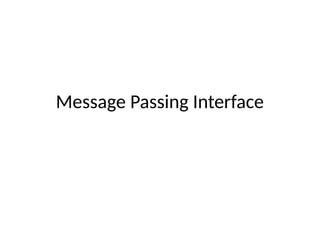
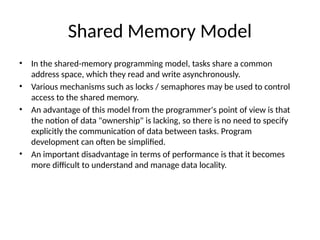
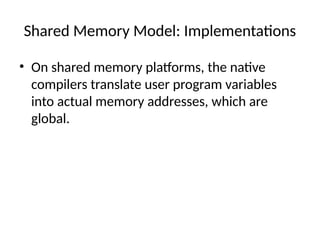
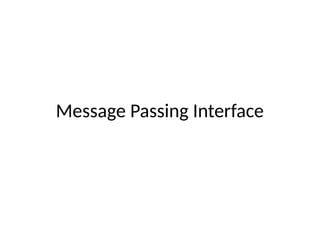
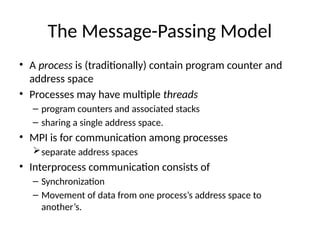
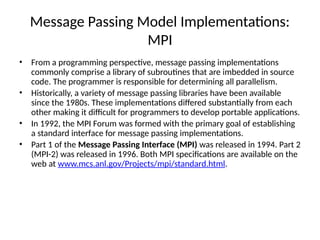
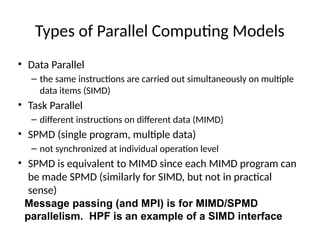
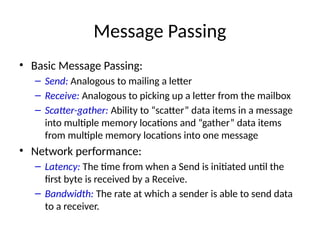
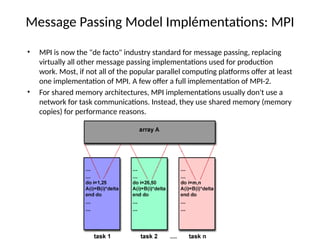
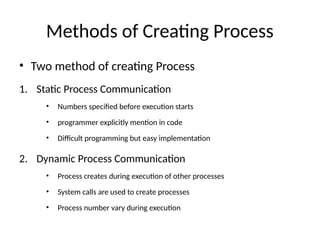
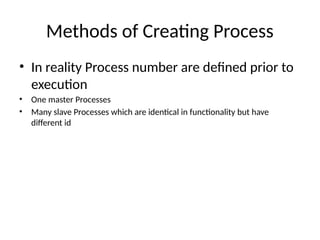
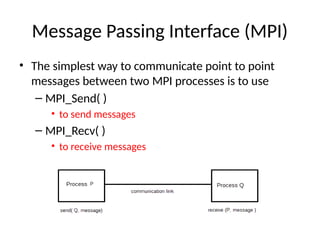
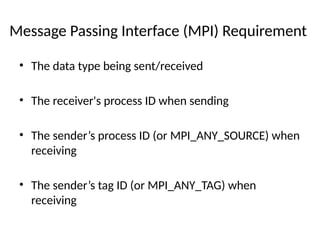
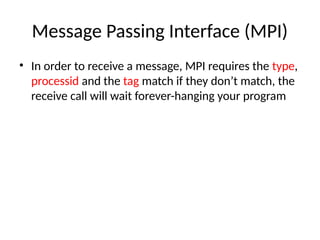
![MPI_Init
It is used initializes the parallel code segment.
Always use to declare the start of
the parallel code segment.
⢠int MPI_Init( int* argc ptr /* in/out */ ,char** argv ptr[ ] /* in/out */)
OR Simply](https://image.slidesharecdn.com/lect5-250130190008-4c83c253-250323072056-a4821757-250405180847-d231916c/85/Wondershare-Filmora-Crack-2025-For-Windows-Free-15-320.jpg)
